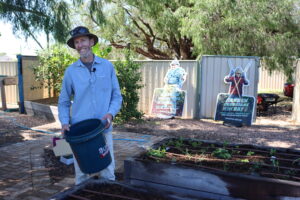In preparation for the cooler months and rain approaching, now is a great time to prepare your garden for winter. Here are some tips from GeoCatch’s Bay OK program and the Garden Guardians of the Bay.
Apply coarse chunky mulch
Apply some coarse chunky mulch to stop the weeds from sprouting. A layer of mulch spread on your gardens maintains soil moisture, protects plant roots and microbes, and feeds the soil as it slowly decomposes.
There are plenty of mulches to choose from. Select a coarse chunky mulch that will let the water run through into the soil. Maintain a 7.5cm thick cover throughout the year.
Use slow release fertilisers
As the first rains of the season arrive, now is a great time to look at correct fertiliser application. The fertilisers that we put on our gardens have the potential to run off into waterways and groundwater, so remember not to fertilise directly before rain is due.
Slow-release fertilisers release nutrients over time, so you don’t have to apply them as often, and they are less likely to run off into our waterways.
Always use composted manures
Now is the time to prepare your winter veggie gardens for an abundance of cool-season produce. Cauliflower, broccoli, and cabbage are some of the delicious, nutritious veggies that can be planted now.
Adding composted manures to your veggie gardens and fruit trees will give them the nutrients they need, without excess runoff into waterways and groundwater.
Composted manures slowly release nutrients and improve the soil. The nutrients are in a form that plants easily take up.
Bay OK recommended application rates are:
🐥 Composted chicken manure 1 kg per square meter.
🐑 Composted sheep manure 2.5 kg per square meter.
🐴 Composted horse manure 2.5 kg per square meter.
🐃 Composted cow manure 2 kg per square meter.
Grow Australian native plants
With moist soils and some warm days remaining before winter takes hold, seedlings will have a high chance of survival.
Choose native plants which are suited to the local soil and climate. They use less water and nutrients, and if you choose the right plant for the right spot, are easy to grow and maintain.
Native plants will attract wildlife into your garden and provide valuable habitat. Try to select a range of species that will ensure year-long flowering to feed wildlife. If you need help with what to plant, Geographe Community Landcare Nursery @gclnursery have some amazing resources online at gcln.org.au, or you can visit the nursery in Busselton.
Add clay to improve sandy soils
Autumn is a perfect time to work on soil improvements. Adding clay to improve sandy soils will help the rainfall stay in the plant’s root zone where it is needed.
Clay modifies the soil structure so that it will hold moisture. You only need to add it once to improve sandy soil.
It’s simple to do but always follow the recommended rates. Tips for applying clay:
– Clay can be added to new gardens and lawns by digging in 20cm deep.
– Sprinkle it onto established lawns and gardens before lightly watering and raking in.
– Prepare holes for new plants by combining clay into the existing soil.




















